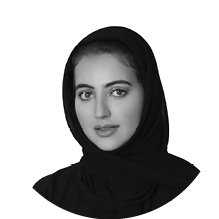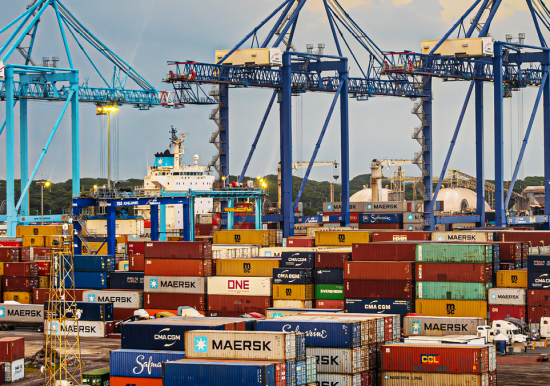
Country Spotlight 2025 & Practitioner Story: United Arab Emirates
The United Arab Emirates (UAE) has lifted itself into the CGGI global top ten, climbing five ranks from 2024 to claim 9th place in 2025 (+19 since 2021). This remarkable rise underscores the country’s consistent efforts in strengthening its institutions and diversifying its economy.
The UAE’s most significant gains are in Financial Stewardship and Strong Institutions. The nation dominates the global rankings of several indicators, taking the top spots in Adaptability, Strategic Prioritisation, Innovation, Implementation, and Country Budget Surplus.
A key driver of the UAE’s success is its strategic focus on innovation and technology‑led governance reforms. The launch of the Science, Technology, and Innovation Policy in 2024 aligns with the country’s broader Vision 2031 and its long-term UAE Centennial 2071 strategy.1
These initiatives aim to enhance research capabilities, accelerate digital transformation, and position the UAE as a leader in emerging industries. The country’s “Projects of the 50” initiative seeks to further foster economic diversification, entrepreneurship, and digitalisation, as it develops its governance model for the future.2
The UAE’s CGGI Rank

The UAE’s Pillar Dashboard

Endnotes
- Emirates Research and Development Council. (5 February 2024). The Science, Technology and Innovation Policy. https://www.uaelegislation.gov.ae/en/policy/details/science-technology-and-innovation-policy
- Bertelsmann Transformation Index (BTI). (2024). United Arab Emirates Country Report 2024. https://bti-project.org/en/reports/country-report/ARE
Developing a Future-Ready Emirati Workforce
The UAE’s Ministry of Human Resources and Emiratisation (MoHRE) plays a pivotal role in achieving its national Vision 2031. H.E. Shayma Yousef Alawadhi, Acting Undersecretary of Labour Market Development & Regulation and Assistant Undersecretary for Communications & International Relations, shares how the ministry is making strides to deepen domestic capabilities, attract global talent, and enhance the labour market’s overall efficiency and competitiveness.
In 2025, the UAE ranked 9th overall on the CGGI and is the only country from the Middle East in the global top ten. What drives good government in the UAE, and how does MoHRE contribute to national objectives?
The UAE leadership places particular emphasis on transparency, adaptability, efficiency, and continuous improvement in public services and institutional performance. The UAE’s Vision 20311 and UAE Centennial 20712 plans provide clear, long‑term direction for our national governance practices and reforms. Towards these goals, the government has adopted comprehensive standards across the public and private sectors to ensure more efficient and effective management, in line with international best practice.
The UAE leadership places particular emphasis on transparency, adaptability, efficiency, and continuous improvement in public services and institutional performance.
The country has invested towards building robust institutions that are characterised by data‑driven decision making, high‑quality performance, and effective coordination. All UAE government entities operate on principles of collaboration and integration. This is crucial because collective effort is needed to effectively implement strategies and objectives, especially in sectors like the labour market, where the state’s role is foundational.

One priority of the UAE is to empower national talent, attract global talent, and enhance the UAE labour market’s efficiency, competitiveness, and innovation. MoHRE plays a central role in aligning the national workforce with this and other strategic priorities, particularly through innovation, strategic workforce planning, and social development. The ministry takes a proactive approach to labour market reforms, continually evaluating the needs of the economy and responding with relevant policies to ensure that the workforce can meet the demands of a rapidly evolving labour market.
An example of the ministry’s key initiatives to enhance competitiveness and innovation is the Emirates Labour Market Award, which acknowledges and rewards businesses and individuals who have contributed significantly to the UAE labour market. The annual award highlights outstanding achievements and practices of companies and individuals to promote a culture of excellence and best practice, encourage others to follow suit, and inspire continuous improvement within the labour market.
As a result of these efforts, our labour market experienced strong growth in 2024. Our total workforce expanded by 12.4%, and the skilled workforce increased by 13.23%. The number of companies has also grown by 17.02%, with new businesses accounting for 32.16%. These figures underscore our labour market’s competitiveness and effective policies.
A key plank of your “We the UAE 2031” national plan towards economic diversification and sustainable development is integrating Emirati talent into the private sector. How has this Emiratisation of the labour force proceeded, and to what effect?
The UAE’s Emiratisation policies are rooted in a comprehensive vision for the country’s future that centres on developing national talent, encouraging their active involvement in national economic growth. To achieve this, MoHRE, which spearheads national Emiratisation efforts, implements a comprehensive policy designed to increase the employment of UAE nationals in the private sector. This policy sets specific targets and regulations for companies based on their size and sector, with the broader objective of diversifying the economy and promoting sustainable development, while driving greater efficiency, agility, and productivity in the labour market.
In 2022, the UAE introduced an Emiratisation mandate requiring companies with 50 employees or more to achieve a 2% annual increase in the Emiratisation of skilled positions. This means that for every 100 skilled employees, at least eight should be UAE nationals by the end of 2025. The goal is to reach a 10% Emiratisation rate by 2026. In 2024, stipulations required companies with 20–49 employees across 14 key economic sectors to hire at least one Emirati by the end of the year and another by the end of 2025. The goal is to involve a wider range of businesses in Emiratisation efforts.
Another key initiative is the Nafis programme, which was established in 2021 to enhance the competitiveness of Emirati professionals through training and development opportunities as well as financial incentives and career counselling. MoHRE works closely with Nafis to eliminate hiring barriers, support compliant businesses, and change perceptions regarding Emirati talent. This enables Emiratis to fill a variety of private sector jobs while keeping pace with evolving labour market needs as we diversify our economy. Emiratisation in the private sector has since reached unprecedented levels. By the end of 2024, 131,883 Emiratis were employed across 28,000 private companies—a 192.5% increase since the launch of Nafis in 2021.
The UAE’s Emiratisation policies are rooted in a comprehensive vision for the country’s future that centres on developing national talent.
How has MoHRE sought to advance governance in its policy and administrative reforms?
Our governance model takes a proactive approach to reforms, prioritising adaptability, efficiency, and sustainability in the labour market. A significant component of this is ensuring the protection of workers and safeguarding their rights. MoHRE, in collaboration with its partners in the public and private sectors, has put in place robust regulations to promote fair treatment and welfare. For example, the Workers Protection Programme provides a financial safety net for workers in case their employers are in financial distress. Another policy, the Unemployment Insurance Scheme, guarantees continued security for employees in the federal government and private sector. During periods of unemployment, this scheme offers financial compensation of up to three months to insured individuals who lose their jobs, while the Wage Protection System ensures that wages are paid to workers efficiently and on time. Such initiatives help ensure good governance in employer‑employee relationships and in the UAE labour market as a whole.3

MoHRE’s governance model also focuses heavily on enhancing compliance with laws and regulations, which is critical in maintaining a stable labour market. The ministry regularly carries out inspections on institutions across the country, ensuring that both public and private sector entities comply with national labour laws so that the rights of workers are protected.
The ministry has also embraced digital transformation—a key aspect of the UAE’s broader governmental vision and governance framework. As part of simplifying governmental procedures and reducing bureaucracy, we have introduced a range of digital services. A prominent example is the Work Bundle4—an integrated digital platform unifying all essential services for the recruitment of private sector employees. Another example is the Labour Market Simulation Model,5 an innovative tool that enables economists, policymakers, and ministry staff to analyse labour market data under a variety of scenarios and conditions, and to estimate the effects of policy changes and trends on labour market metrics, such as employment, wages, and workforce participation.

Our ministry-level initiatives reflect a broader governmental trend. The UAE invests heavily in online public services, connectivity, and ICT‑driven initiatives. It has since been recognised as a front‑runner in digital governance: notably, we achieved a perfect 1.000 score in the Telecommunication Infrastructure Index, the only country to do so, and we lead all Asian and Arab nations in the Human Capital Index for e‑government.6
What do you see as the main challenges in the next few years, and how are you addressing them?
Given the radical transformations in the global economy—particularly with the rise of automation, data-driven industries, and the gig economy—we see addressing the skills gap as the most prominent challenge ahead of us. We need to ensure our workforce is equipped with new capabilities that are fast becoming an essential part of doing business internationally.
We are continually addressing challenges brought about by rapid economic developments, including skills gaps, and seeking to align education with labour market demands. For instance, one of our ongoing priorities is ensuring that young Emiratis are well-prepared to contribute to the UAE’s growing economy. The ministry supports our youth with career advancement opportunities. We also have initiatives to bridge gaps in private sector job incentives, including programmes to subsidise wages and enhance job stability, and to reduce disparities between private sector employees and their peers in the government sector.7
Another area of focus is artificial intelligence (AI). While specialised talent is still lacking in this area, the UAE is already addressing this important technological opportunity with significant investments: we expect the contribution of AI to our economy to reach some AED 96 billion by 2030. MoHRE has established partnerships to create tailored training programmes for students to gain practical skills and real-world work experience in AI fields, reinforcing the connection between education and the labour market.
A continual challenge is ensuring that UAE has a steady supply of qualified professionals to drive business expansion and economic growth. We are developing initiatives to support job creation and attract and retain top talent from all around the world. For instance, in 2021, the UAE introduced new visa schemes to bring in talent and independent entrepreneurs. This includes the Green Visa, which gives holders self-residency without being tied to a company work permit, the Freelancer Visa for the self-employed,8 and the Golden Visa giving foreign talent—including not just investors but outstanding individuals, such as experts in the sciences or humanitarian pioneers—long‑term residency to live, work, or study in the UAE with special benefits.9 10 In February 2025, we added a Blue Visa, offering 10‑year residency to individuals who make exceptional contributions in the field of protecting the marine or land environment.
As the workforce diversifies in the coming years, with increasing numbers of migrant workers entering the labour market, we will also need to revisit and enhance our current policies to strengthen social protections for workers, particularly those in vulnerable sectors. This is to ensure we provide robust support to those who need it most, even as the UAE grows economically.

Endnotes
- “We the UAE 2031” vision is a national plan for UAE’s development over the next 10 years, with a focus on social, economic, investment, and development areas to enhance UAE’s position as a global partner and an attractive and influential economic hub. (See https://wetheuae.ae/en)
- The UAE Centennial Plan 2071 is a long‑term, full‑vision plan that extends for 5 decades after 2021 and forms a roadmap for the government’s long‑term vision of fortifying the country’s reputation and soft power. The plan also aims at investing in future generations, by preparing them with the skills and knowledge needed to face rapid changes. (See https://u.ae/en/about-the-uae/strategies-initiatives-and-awards/strategies-plans-and-visions/innovation-and-future-shaping/uae-centennial-2071)
- To ensure labour market governance and enhance compliance with laws and regulations, the Ministry has strengthened its partnerships to conduct joint inspection campaigns, carrying out more than 2,200 joint inspections with partners in 2024. (See the January 2025 issue for MoHRE’s Labour Market magazine: https://www.mohre.gov.ae/magazines_en/magazine38/index.html)
- Ministry of Human Resources & Emiratisation (MoHRE). (11 June 2024). Awareness and Guidance: Work Bundle. https://www.mohre.gov.ae/en/media-center/awareness-and-guidance/work-bundle.aspx
- Aletihad News Center. (18 October 2024). GITEX Global 2024: MoHRE launches ‘Labour Market Simulation Model’ to enhance decision‑making efficiency. https://en.aletihad.ae/news/uae/4523071/gitex-global-2024–moh-relaunches-labour-market-simulation
- Telecom Review. (25 September 2024). UAE Ranks First in the UN-DESA’s Telecommunication Infrastructure Index. https://www.telecomreview.com/articles/reports-and-coverage/8419-uae-ranks-first-in-the-un-desa-s-telecommunication-infrastructure-index
- Alassaf, A. (10 October 2024). Analyzing Salary Inequalities In UAE And The Forces Behind Such Inequalities. International Journal of Creative Thoughts. https://ijcrt.org/papers/IJCRT2410143.pdf.
- Saeendran, S. (11 September 2021). UAE Green Visa, Freelancer Visa, Golden Visa: What we know about the new visa schemes so far. Gulf News. https://gulfnews.com/uae/uae-green-visa-freelancer-visa-golden-visa-what-we-know-about-the-new-visa-schemes-so-far-1.82137981
- The United Arab Emirates’ Government portal. (15 July 2024). Golden visa. https://u.ae/en/information-and-services/visa-and-emirates-id/residence-visas/golden-visa
- A content creators visa was also introduced this month as part of the Golden Visa scheme, allowing content creators to apply for a 10‑year residency through the UAE’s Creators HQ project. (See: https://www.thenationalnews.com/news/uae/2025/02/25/blue-visa-uae-apply-dubai/)

H.E. SHAYMA YOUSEF ALAWADHI
Acting Undersecretary of Labour Market Development & Regulation and Assistant Undersecretary for Communications & International Relations, Ministry of Human Resources and Emiratisation (MoHRE)
In her dual role at MoHRE, Alawadhi helps shape the UAE’s labour market landscape, driving strategies that address the dynamic needs of the market, enhance labour protection, and propel digital business development. She has also led the ministry’s communications and international relations since 2022, spearheading bilateral and multilateral discussions on the UAE labour market and fostering global partnerships. She previously held managerial roles at the Federal Authority for Government Human Resources and Abu Dhabi Securities Exchange, following a career in the UAE tech industry.
More Stories


Global Influence & Reputation Country Snapshot: Türkiye

